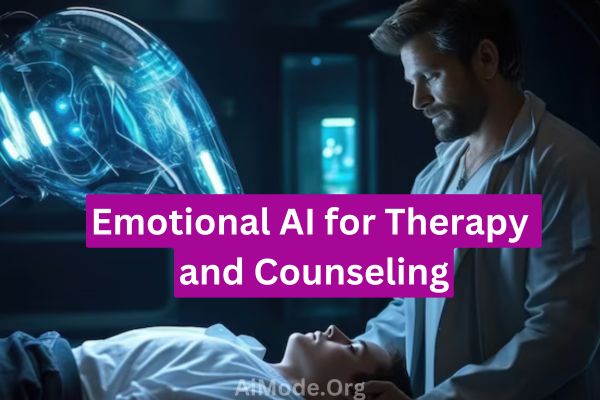The integration of Emotional Artificial Intelligence (AI) in therapy and counseling has transformed how mental health care is delivered. By leveraging technologies such as natural language processing (NLP), sentiment analysis, and emotion detection, therapists and counselors can enhance their practice, improve client outcomes, and extend the reach of mental health services.
In this article, we will explore how Emotional AI is reshaping therapy and counseling, supported by data, real-world applications, and key use cases.
Also See: AI in Disaster Recovery: Predicting, Preparing, Relief Efforts
Emotional AI for Therapy and Counseling: Transforming Mental Health Care
What is Emotional AI?
Emotional AI refers to the branch of artificial intelligence designed to identify, analyze, and respond to human emotions. By interpreting facial expressions, voice tone, text inputs, and even physiological data, these systems offer profound insights into emotional states.
Core Components of Emotional AI in Therapy
| Component | Description | Examples in Therapy |
|---|---|---|
| Natural Language Processing (NLP) | Analyzes text and speech to detect sentiments and emotional cues. | Identifying depressive language patterns. |
| Facial Emotion Recognition | Tracks subtle facial expressions to gauge emotional states. | Detecting stress during video sessions. |
| Voice Analysis | Analyzes tone, pitch, and rhythm to detect emotions like anxiety or anger. | Identifying frustration through vocal patterns. |
| Physiological Monitoring | Uses biometric data (e.g., heart rate, skin temperature) to assess emotions. | Real-time stress tracking via wearable devices. |
Applications of Emotional AI in Therapy and Counseling
1. Enhancing Client Accessibility
The growing mental health crisis has highlighted the shortage of therapists. Emotional AI provides scalable solutions that make mental health services accessible to a wider population.
Chatbots and Virtual Assistants
AI-powered platforms like Wysa and Woebot simulate therapeutic conversations using NLP. These tools engage users in cognitive-behavioral techniques (CBT), mindfulness exercises, and emotional support without the need for a human therapist.
Also See: Role of AI in Climate Change: Solutions and Sustainability
Remote Counseling
Therapists using Emotional AI in telehealth settings benefit from emotion recognition capabilities that allow them to assess a client’s state more effectively during virtual sessions.
Key Data Point:
A 2022 report by Mental Health America found that 35% of individuals experiencing mild anxiety preferred AI-assisted chat therapy over traditional methods due to its anonymity and immediate availability.
2. Boosting Therapist Efficiency
Emotional AI tools streamline therapists’ workflows by providing actionable insights. These systems analyze session recordings, detect emotional trends, and highlight critical areas of concern.
| Traditional Workflow | AI-Enhanced Workflow |
|---|---|
| Manual note-taking and subjective interpretation. | Automated transcription and sentiment analysis. |
| Delayed recognition of emotional patterns. | Real-time alerts for recurring negative emotions. |
Case Example:
During counseling, Emotional AI can analyze a client’s language to detect cognitive distortions such as “all-or-nothing thinking.” The therapist can then focus on these patterns during interventions.
3. Real-Time Emotional Monitoring
Emotional AI enables continuous monitoring of a client’s emotional health between sessions. By analyzing physiological signals or text inputs from journaling apps, therapists can track emotional shifts and adjust their therapeutic approach as needed.
Wearable Devices in Therapy
Devices like smartwatches or biometric sensors capture real-time data, including heart rate variability or stress levels. Emotional AI processes this data to alert therapists about significant emotional fluctuations.
| Scenario | Impact on Therapy |
|---|---|
| A client shows elevated stress levels before a session. | The therapist focuses on relaxation techniques. |
| AI detects consistent low mood from journaling entries. | Introduce cognitive restructuring to address depression. |
Data Insight:
Studies from Harvard Medical School showed that clients who used AI-driven emotional tracking reported a 20% improvement in managing anxiety symptoms compared to traditional methods.
Also See: Importance of Artificial Intelligence in Education
4. Personalized Therapeutic Interventions
Every individual experiences emotions differently, making personalized care crucial. Emotional AI provides insights that allow therapists to tailor their approaches.
Examples of Personalization
- Sentiment Analysis: Emotional AI analyzes clients’ journal entries or session transcripts to detect recurring themes, such as feelings of guilt or hopelessness.
- Dynamic Voice Analysis: Adjusts the focus of sessions by identifying stress or frustration through voice modulation.
- Custom Strategies: AI tools suggest CBT exercises, mindfulness techniques, or even recommend lifestyle changes based on a client’s specific emotional needs.
Real-World Example:
A therapist using an AI platform might receive a report indicating that a client frequently uses negative language about self-worth. This insight could prompt discussions around building self-esteem or resilience.
5. Group Therapy and AI Moderation
In group therapy, Emotional AI can track the emotional dynamics of participants, ensuring balanced participation and identifying individuals who may require additional support.
| Feature | Application in Group Therapy |
|---|---|
| Emotion Detection | Tracks emotional responses of participants in real-time. |
| Sentiment Summarization | Summarizes group mood to guide discussions. |
| Individual Alerts | Flags participants showing distress for follow-up. |
Impact on Mental Health Outcomes
The incorporation of Emotional AI into therapy has already demonstrated significant improvements in client satisfaction and outcomes:
| Metric | Improvement with Emotional AI |
|---|---|
| Reduction in Therapy Dropouts | 25% fewer dropouts due to personalized interventions. |
| Faster Emotional Insights | 40% faster detection of emotional distress patterns. |
| Client Satisfaction | 85% satisfaction with AI-assisted therapy tools. |
Conclusion
Emotional AI is revolutionizing therapy and counseling by combining cutting-edge technology with human-centric care. Its applications—ranging from real-time emotional monitoring to personalized therapeutic interventions—are making mental health services more effective and accessible than ever before.
Also See: 70 Latest Artificial Intelligence Topics For Phd
With tools like NLP-driven chatbots, wearable emotional monitors, and data-rich insights, therapists can deepen their understanding of clients’ needs while fostering meaningful connections. Emotional AI not only supports professionals in their work but also empowers clients to take proactive steps in their mental health journey.
